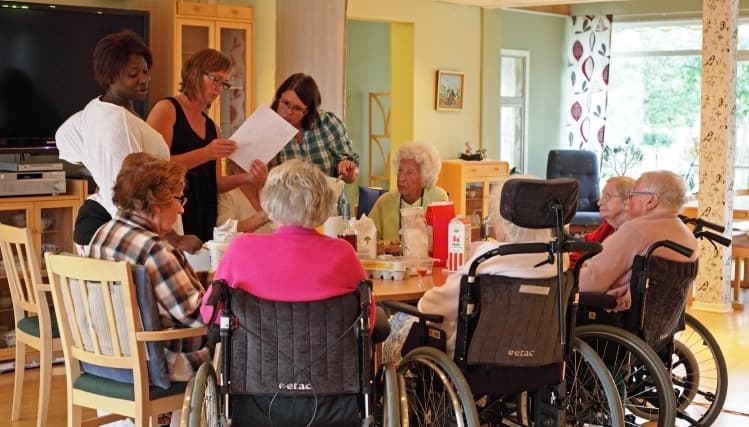If you can plan at least five years in advance, you’ll be better off if you’re worried about how to protect your assets from nursing home costs.
- Setting Up a Special Needs Trust
- Buying Long-term Care Insurance
- Purchase a Medicaid-Compliant Annuity
- Making a Gift
- Form a Life Estate
- Paying for Care in Advance
- Giving Away Assets
- Making a Will
You can learn how to protect assets from nursing home costs by following the instructions in this blog post.
Table of Contents
Why is There a Need to Protect My Assets from Nursing Home Expenses?
Following are the reasons to protect my assets from nursing home expenses:
To avoid depleting all of your assets: To avoid exhausting all of your assets is one of the main justifications for protecting them from nursing home costs. If you don’t have any protection, the cost of care may consume all of your savings and assets.
To qualify for government assistance: Another reason to protect your assets is to ensure you qualify for government assistance. Medicaid and Canada’s Guaranteed Income Supplement may not be available to you if you have too many assets.
To ensure your loved ones are taken care of, another reason to protect your assets is to ensure your loved ones are taken care of if you need to enter a nursing home. Your loved ones might be forced to use their own assets to pay for your care if you don’t have any protection in place.
How Can I Protect My Assets from Nursing Home Expenses?
There are several ways you can protect your assets from nursing home expenses, including:
Setting Up a Special Needs Trust
To assist people with disabilities who struggle to manage their finances, special needs trusts have been created. Nursing home care, assisted living, and even home care are covered by the funds put into the trust.
Buying Long-term Care Insurance
Long-term care insurance is an insurance policy that covers long-term care costs. Nursing home care, assisted living, and home care are all possible types of care.
Purchase a Medicaid-Compliant Annuity
A Medicaid-compliant annuity is relevant when there’s a spouse who isn’t institutionalized. When properly structured, it’s a way to “spend down” and reduce the income Medicaid takes into account when determining whether you are eligible for that help. People tend to make this purchase when they’re in a last-minute or crisis Medicaid planning situation, notes Shawn Plummer, CEO of The Annuity Expert.
“Annuity purchasers are effectively giving a lump sum of money to an annuity company in exchange for equal amounts of monthly payments to a healthy spouse while the other unhealthy spouse is receiving medical assistance subsidized by Medicaid,” he explains.
Making a Gift
To assist a loved one with nursing home costs, you can give them your assets. Either during your lifetime or through your will, it can be accomplished.

Form a Life Estate
Some asset protection strategies necessitate advance planning, or at least five years before you’ll require nursing home care. That’s because the Medicaid system has a five-year “look-back” period that’s designed to keep applicants from giving assets away or selling them at less than fair market value in order to qualify.
That look-back period applies to the life estate strategy, which allows a homeowner to keep a house until they die, even if death occurs in a nursing home.
With a life estate, “The home passes to the ‘remainderman,’ who is the person listed on the deed as the person to inherit the property upon the death of the ‘life tenant,'” says Weisman. He adds that it differs from a joint tenancy in that until the homeowner dies, the “remainderman” has no interest in the property.
Paying for Care in Advance
In order to avoid depleting all of your resources, you can also pay for nursing home care in advance. Long-term care insurance, annuities, and life insurance policies are just a few of the different ways you can go about doing it.
Giving Away Assets
Giving away your assets is another way to keep them safe. Gifting is a technique that can be used to accomplish this. Each of your loved ones is eligible for a $14,000 annual gift that is tax-free.
Making a Will
Make sure you have a will in place as a final measure to safeguard your assets. You can specify who will receive your assets after your death in a will. The laws of your state will determine how your assets are distributed if you don’t have a will.
What Are the Tax Implications of Protecting My Assets from Nursing Home Expenses?
It has several tax repercussions to shield your assets from nursing home costs. For example:
- You might be eligible for a tax deduction for the amount you contribute to the trust if you create a special needs trust to assist with nursing home care.
- You may be able to deduct the cost of long-term care insurance from your taxes if you buy it.
- Gift taxes may apply if you give assets to a loved one to assist with nursing home expenses.
- You might be able to claim a tax deduction for the cost of nursing home care if you pay for it in advance.
Make sure to speak with an accountant or tax specialist to learn more about the tax implications of protecting your assets from nursing home expenses.
What Are Some of the Risks of Protecting My Assets from Nursing Home Expenses?
There are a few risks to be aware of when it comes to protecting your assets from nursing home expenses, including:
- The risk of losing government benefits:You might not be eligible for government benefits like Medicaid or Canada’s Guaranteed Income Supplement if you have a lot of assets.
- The risk of losing control over your assets: If you leave property to a family member, you might not be able to control how it is used.
- The risk of not having enough assets: If you don’t have enough money saved up to pay for nursing home care, you might spend everything and leave your loved ones with nothing.
- The risk of paying taxes:Protecting your assets from nursing home costs has several tax ramifications.
To learn more about the dangers of protecting your assets from nursing home costs, be sure to speak with an accountant or tax specialist.
Tips & Warnings
- State-specific spousal maintenance cutoff amounts vary, but you can increase the monthly amount you give to your spouse by one-third for each dependent adult child or minor child residing in your home.
- State Medicaid officials have the right, under the Omnibus Budget Reconciliation Act of 1993, to recover any moneys used for your nursing home care from your estate after your passing. Therefore, any assets that you did not properly shelter before going to the nursing home could be lost to your heirs.
- If you give money to family members in excess of the annual limit, you might be liable for gift taxes. The maximum amount of money you can give a loved one tax-free as of 2012 is $13,000. This sum fluctuates from time to time.
Conclusion
Start putting money away now if you haven’t already. You can’t put your assets in a time capsule and expect them to still exist when you need them; instead of waiting for the worst-case scenario, prepare by saving money so that it will be there when you need it. The most important thing is to not forget about retirement; even though it may seem far off, the sooner you start saving, the better off you will be in the long run.
Nobody can predict what the future will bring, but by preparing for every conceivable scenario, you can feel confident that you will be able to handle whatever comes your way. So begin saving now and don’t stop!


